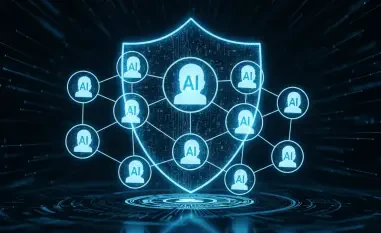The tech industry is constantly evolving, and with it, the demand for specific skillsets. IT certifications have become a crucial factor in career advancement and salary increments for professionals. This article delves into the most lucrative certifications and their impact on the job market, particularly in cloud computing and cybersecurity.
The Financial Impact of IT Certifications
Significant Pay Hikes for Certified Professionals
Earning IT certifications can lead to substantial salary increases. Some professionals have reported pay hikes of up to $40,000 over the previous year. This trend underscores the value that employers place on certified skills, particularly in high-demand areas like cloud computing and cybersecurity. IT certifications act as tangible proof of knowledge and capability, offering a competitive edge in a crowded job market.
Skillsoft, an online learning platform, has analyzed global IT professional salaries to identify the highest-paying certifications. Their findings reveal that the AWS Certified Security Specialty certification tops the list with an average annual salary of $204,000. This represents a notable 22% or $40,000 increase from the prior year, highlighting the sustained demand for cloud computing skills. This significant pay hike not only draws attention to the specific needs within the industry but also serves as an indicator of future trends in IT certification value.
Skillsoft’s Analysis of Global IT Salaries
Skillsoft’s comprehensive analysis sheds light on the varying financial impacts of IT certifications across the globe. The report demonstrates that while traditional degree programs remain valuable, certifications can fast-track career progression in a more targeted and efficient manner. The top-ranking AWS Certified Security Specialty exemplifies this trend, reinforcing the pivotal role that cloud computing skills play in today’s job market.
Other high-paying certifications identified by Skillsoft include the Google Cloud – Professional Cloud Architect and the Nutanix Certified Professional – Multicloud Infrastructure (NCP-MCI) v6.5, which command average salaries of $190,204 and $175,409, respectively. These figures underscore the substantial financial benefits attached to specialized certification paths, reflecting the broader industry shift towards cloud and multi-cloud strategies. The analysis serves as a critical resource for IT professionals aiming to maximize their earning potential through targeted skill development.
Dominance of Cloud Computing Certifications
AWS Certifications Leading the Market
AWS certifications continue to dominate the market in terms of demand and financial rewards. Indeed, a job search platform, also ranked an AWS certification at the top of their list. Their study showed that AWS Certified Solutions Architects could earn between $133,200 and $246,900 annually, signifying a strong demand for AWS expertise. This considerable earning range highlights the flexibility and depth of skills that AWS certifications offer, making them a valuable asset for IT professionals.
The prominence of AWS certifications can be attributed to the widespread adoption of AWS services across various industries. Companies are increasingly relying on AWS to provide scalable, reliable, and cost-efficient cloud solutions, thereby creating a consistent demand for professionals with AWS expertise. These certifications not only validate one’s technical skills but also open up a plethora of career opportunities in areas like cloud architecture, deployment, and security.
Diverse Cloud Skillsets in Demand
The value of a diverse cloud skillset is evident from the presence of certifications for various cloud platforms like Google Cloud Platform (GCP), AWS, Azure, and Nutanix. Organizations are increasingly adopting multi-cloud and hybrid cloud strategies, making these skills crucial for IT professionals. The ability to navigate and integrate multiple cloud services is becoming a critical competency, as businesses seek to optimize their IT environments for better performance and agility.
Furthermore, the demand for professionals who can manage multi-cloud environments is fueled by the need to avoid vendor lock-in and leverage the unique capabilities of different cloud platforms. Certifications in GCP, Azure, and Nutanix provide evidence of this expertise, ensuring that professionals are well-equipped to handle the complexities of modern cloud infrastructures. As companies invest in multi-cloud strategies, the demand for certified professionals with a broad cloud skillset is expected to rise significantly.
Top Certifications According to Skillsoft
Google Cloud and Nutanix Certifications
Skillsoft’s top five certifications include the Google Cloud – Professional Cloud Architect with an average salary of $190,204 and the Nutanix Certified Professional – Multicloud Infrastructure (NCP-MCI) v6.5 averaging $175,409. These certifications reflect the growing importance of multi-cloud environments in the industry. Google Cloud’s prominence is driven by its strong data analytics, machine learning capabilities, and seamless integration with various services, making it a desirable skill for IT professionals.
Nutanix certification, on the other hand, highlights the need for expertise in managing hyper-converged infrastructure, which simplifies the deployment and operation of private clouds. Professionals with Nutanix certification are equipped to handle diverse workloads, automate critical processes, and optimize performance across multi-cloud environments. As enterprises embrace hybrid cloud models, the ability to manage and integrate complex infrastructures will become increasingly valuable, positioning Nutanix certification holders as key players in the IT landscape.
Security-Focused Certifications
Security-focused certifications also feature prominently in Skillsoft’s list. The Certified Cloud Security Professional (CCSP) averages $171,524, while the CCNP Security certification averages $168,159. These certifications highlight the critical need for cybersecurity expertise in today’s digital landscape. With the ever-growing threat of cyber attacks and data breaches, organizations are placing a premium on professionals who can safeguard their digital assets.
The CCSP certification equips professionals with advanced skills in securing cloud environments, focusing on areas such as architecture, governance, and risk management. Similarly, the CCNP Security certification validates one’s ability to secure network infrastructures, a fundamental aspect of maintaining robust cybersecurity. As cyber threats continue to evolve, the demand for certified security professionals is only expected to increase, emphasizing the importance of continuous learning and certification in this field.
Indeed’s Top IT Certifications
AWS and Data Privacy Certifications
Indeed’s list aligns with Skillsoft’s findings, showcasing the AWS Certified Solutions Architect – Associate and the Certified Data Privacy Solutions Engineer (CDPSE) among the top certifications. These certifications emphasize the importance of cloud computing and data privacy skills in the current job market. The AWS Certified Solutions Architect – Associate certification, in particular, demonstrates one’s ability to design and deploy scalable systems on AWS, reflecting a strong demand for AWS solutions in various industries.
The CDPSE certification, on the other hand, focuses on the critical aspect of data privacy, which has become increasingly important in light of stringent data protection regulations. This certification validates skills in implementing privacy-by-design solutions, ensuring compliance with global privacy laws. As data privacy concerns continue to grow, the demand for professionals with CDPSE certification is expected to rise, highlighting the intersection of technology and regulatory compliance.
Ethical Hacking and Data Professional Certifications
The Certified Ethical Hacker (CEH) and Certified Data Professional (CDP) certifications also feature in Indeed’s list. These certifications indicate a growing demand for skills in ethical hacking and data management, essential for maintaining secure and efficient IT environments. The CEH certification equips professionals with the skills to identify and address security vulnerabilities, playing a crucial role in proactive cybersecurity measures.
The CDP certification, meanwhile, underscores the importance of effective data management, covering areas such as data governance, analytics, and integration. As organizations increasingly rely on data to drive decision-making, the ability to manage and analyze data effectively becomes a valuable skill. Certifications in ethical hacking and data management not only enhance one’s employability but also contribute to creating more secure and data-driven organizations.
The Role of Cybersecurity Certifications
Gartner’s Insights on Cybersecurity Certifications
Gartner Research, an esteemed research and advisory company, confirmed the prominence of AWS and Microsoft Azure certifications in their August report. They identified AWS Certified Cloud Practitioners and Microsoft Certified Azure Fundamentals as leading upskilling opportunities for tech workers. The demand for IT certifications in cybersecurity continues to rise, as evidenced by the popularity of certifications such as the CISSP, CISA, and CompTIA Security+. These certifications serve as proof of one’s ability to protect and manage digital infrastructure effectively.
Gartner’s emphasis on cybersecurity certifications reflects the broader industry trend towards prioritizing security in the face of increasing cyber threats. The CISSP certification, recognized globally, validates advanced skills in designing, implementing, and managing cybersecurity programs. Similarly, the CISA and CompTIA Security+ certifications focus on key aspects of auditing and securing information systems, reinforcing the critical role of cybersecurity professionals in today’s digital age.
Practical Expertise and Marketability
From a broader perspective, Gartner emphasizes the importance of demonstrating practical expertise through industry-recognized certifications. While not always a mandatory requirement, these certifications empower both individuals and organizations, indicating a significant enhancement in professionals’ marketability and the ability of teams to tackle complex IT environments. Practical expertise validated by respected certifications assures employers of a candidate’s capability to address real-world challenges effectively.
Such certifications provide a significant career boost by opening up advanced job roles and higher salary brackets. They serve as a testament to one’s commitment to continuous learning and adaptation, qualities highly valued in the fast-evolving tech industry. As businesses navigate the complexities of digital transformation, certified professionals with hands-on experience are increasingly sought after to lead and support such initiatives.
Emerging Trends in AI Certifications
Slow Rise of AI Certifications
While AI certifications are not yet topping IT certification lists, there is a rising demand for AI skills across various sectors. The increase in job postings for AI-skilled workers reflects this demand. Organizations like TikTok, Apple, Google, Amazon, and Deloitte are among the most active recruiters for AI talent, indicating a growing interest in roles such as data scientists, AI research engineers, and machine learning engineers.
The slow rise of AI certifications can be attributed to the evolving nature of AI technologies and the ongoing development of standardized certification programs. However, as AI continues to permeate various industries, the demand for certified AI professionals is expected to grow. This trend underscores the need for IT professionals to stay abreast of developments in AI and seek relevant certifications to enhance their career prospects in this rapidly advancing field.
WilsonHCG’s Report on AI Certifications
WilsonHCG, a recruitment and talent consulting firm, reported a noteworthy rise in the number of AI-focused certifications. Job postings for AI-related roles have increased from the 12-month average, driven by a growing interest in data-driven and AI-enabled functions across multiple industries. This surge in job postings highlights the expanding role of AI in areas such as automation, predictive analytics, and intelligent decision-making.
AI certifications, while still emerging, are becoming increasingly recognized as valuable credentials that validate one’s proficiency in AI technologies. As companies continue to integrate AI into their operations to enhance efficiency and innovation, the demand for AI-certified professionals is likely to rise. WilsonHCG’s report underscores the importance of staying ahead in the rapidly evolving tech landscape by acquiring relevant AI certifications.
The Shift Towards Skills-Based Hiring
Emphasis on Practical Skills Over Formal Education
The broader trend in the tech industry is shifting towards skills-based hiring approaches. Employers are increasingly valuing strong work backgrounds, certifications, assessments, and endorsements over traditional formal education. This shift highlights the importance of practical skills and real-world experience in securing high-paying IT roles. The focus is on what candidates can do and how effectively they can apply their knowledge to solve real-world problems.
This approach allows for a more dynamic and flexible workforce, capable of adapting to new technologies and industry changes quickly. It also democratizes access to high-paying jobs by focusing on skill proficiencies rather than academic pedigrees. Employers are placing a premium on certifications that demonstrate hands-on expertise, making them a critical component of career advancement in the tech industry.
Importance of Soft Skills
The tech industry is in a constant state of evolution, necessitating an ever-changing array of skillsets. As professionals strive to keep up, obtaining IT certifications has emerged as a critical factor in achieving career growth and earning potential. These certifications validate expertise in various technical domains and are a testament to a professional’s dedication and proficiency. In particular, certifications in cloud computing and cybersecurity are recognized as some of the most beneficial in today’s job market. These specialized fields are crucial as businesses migrate to the cloud and prioritize securing their digital assets. Earning certifications in these areas not only enhances one’s employability but also opens doors to higher salary brackets and career progression opportunities. The value of such certifications goes beyond just the technical skills; they also signal to employers a commitment to staying current with industry trends and standards. This article explores the highest-paying certifications and their significant impact on the employment landscape, underscoring the importance of continuous learning and accreditation in a technology-driven world.













